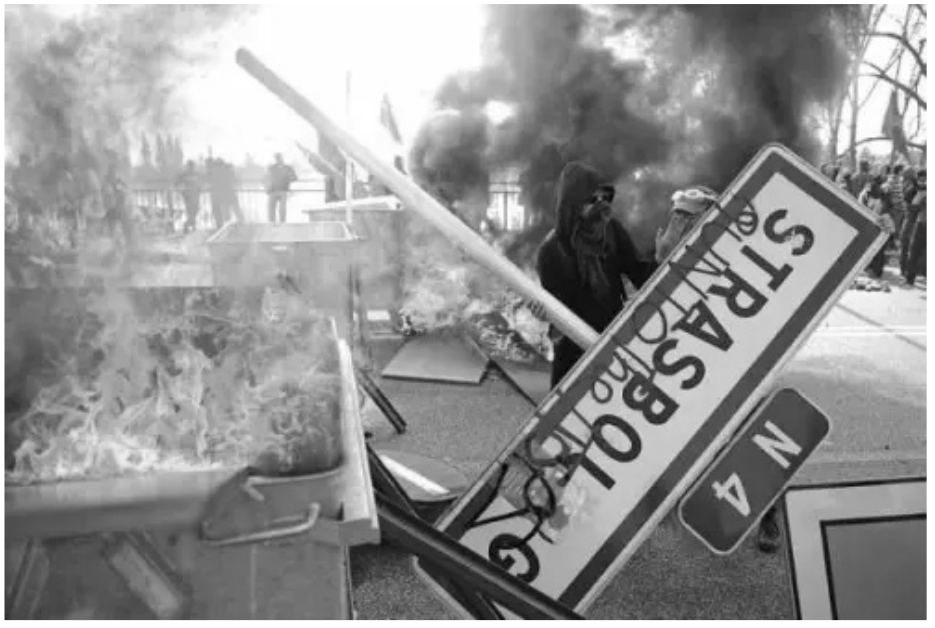
In April 2009, Strasbourg was the scene of an explosion of anger, a collective cry against NATO and its militarist and imperialist policies. Thousands of protesters came together at the border of France and Germany to oppose NATO'S 21st summit, determind to voice their anger against this institution which has justified for decades war and colonization in the name of security.
The mobilizations began long before the first banners were deployed. Although the counter-summit organization's was marked by heated debates on the topic of violence in social movements, the numerous meetings, assemblies and preparation actions crystallized the desire to fight in many demonstrators. Affinities grew strongers, tactics were discussed and a willingness to confront settled. “For us, resistance was clear: we couldn’t remain passive in the face of a system that respects neither life nor freedom.”
Exacerbeted by the 2008 economic crisis, the summit was the occasion for anticapitalit, anarchist and the peace movement to make their voices heard. Around 3000 people, coming from all over Europe and even the U.S., settled on a vast plaza 8km from downtown Strasbourg.
Strasbourg's city center was transformed into a fortified city : barricades, mouted police patrols, helicopters circling the sky and even surface-to-air missile batteries were installed around the city. However, this didn't stop protesters from entering the heart of the hot zone.
On the Saturday, the April 4th, after violent clashes with the police in the previous days ended with 300 arrestations, around 30 000 people stormed the city. Quickly, a huge black bloc of over 2000 people formed within the protest.
Peace police: who are these parasites?
Peace police are people that see themselves like guardian of protester's security and of the movement's image, therefore opposing all other form of protesting the they would judge as being "violent". Yet, their so called empathy often hides authoritarian and violent dynamics: they impose their limits to political struggles, divide the movement and become complicit with police repression.
Peace police don't only settle for criticizing methods or tactics of the struggle, but in some cases they will go as far as denouncing and physically restraining other demonstrators. By agressively interposing and using intimidation tactics, they seek to impose ther vision of an "acceptable" protest. While the mainstream media narrative already distinguish "good" protesters from the "bad ones", peace police exacerbate this division within the movement.
The choice of tactics in a given context should be guided by a will to maximize respect for life. Above all, when the dilemma lies between the lack of media coverage and the condemnation of a disruptive protest, it is crucial to weigh the stakes. While thousands of people are killed each month, keeping the integrity of banks windows that financed a genocide should not be at the top of the priority list.
Peace police , you are not welcomed
Despite some attempts—perfectly illustrating the polarization within the movement—by peace police and some organizers who tried to maintain a peaceful demonstration, black flags took over the city. A pharmacy, a hotel, and a former customs post were set on fire. A chapel, a gas station, a convenience store, a post office, and about a dozen private businesses were ransacked. Urban furniture was smashed to pieces. For a moment, anything was possible. The damage was estimated at nearly 100 million euros.
By focusing of the protesters violent tactics, mainstream media did everthing to distort the message carried by those who chose confrontation, therefore diverting attention from the real atrocities committed by NATO, responsible of million of deaths. As we denounce the brutality of the institutions that govern us, it is crucial to remember that the true violence is that of the States.
These large gatherings are privileged opportunities to spread our ideals. We must be clever, navigate the media bias, and be able to create alternative narratives—stories that show that the struggle for freedom is legitimate and necessary. Strasbourg was an opportunity for many comrades to unite in resistance and for groups from diverse backgrounds to come together around a common goal: to abolish the structures of oppression that govern us.
Strasbourg 2008 was not an end, but a beginning. Montreal 2024, let’s embrace the revolt and fuel the fire of our determination!
